

Keep us simple, keep us safe: The post-9/11 comeback of the Average Australian Bloke. 1 The name “Liberal Party” can be confusing for US-based readers in particular.
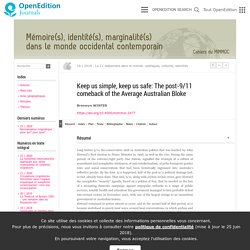
In the US, “liberal” (...) 1It is tempting, in a so-called “post-9/11 world”, to attribute any national, international or transnational dramas involving security, rights, civil liberties, attitudes to women, refugees, anti-Arab or anti-Muslim racism, masculinity, militarisation, neo-conservatism and so on, to some sort of “post-9/11 effect”−at least among the supposed main players in the post-9/11 scenario.
Yet 9/11 did not happen out of nowhere. 'Immigrants, Not Americans, Must Adapt' In the aftermath of the September 11 terrorist attacks on the U.S. in 2001, opinion pieces expressing anti-immigrant, anti-Muslim viewpoints were rife on the internet, particularly one that eventually came to be attributed to Australia’s then-prime minister Julia Gillard (and, much later, U.S.
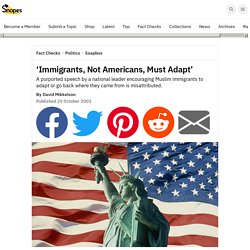
President Donald Trump): Australia says NO — This will be the second Time Julia Gillard has done this! She sure isn’t backing down on her hard line stance and one has to appreciate her belief in the rights of her native countrymen.A breath of fresh air to see someone lead.? The World Today - Muslim groups rile against Howard comments. ELEANOR HALL: In the Sydney suburb of Eastwood today, Prime Minister John Howard restated his view that some Australian Muslims need to learn English and treat women better in order to fit in with Australian values.
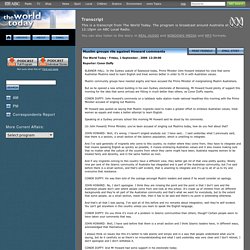
Muslim community groups have reacted angrily and have accused the Prime Minister of marginalising Muslim Australians. But as he opened a new school building in his own Sydney electorate of Bennelong, Mr Howard found plenty of support this morning for the idea that some arrivals are fitting in much better than others, as Conor Duffy reports. CONOR DUFFY: John Howard's comments on a talkback radio station made national headlines this morning with the Prime Minister accused of singling out Muslims. Mr Howard was quoted as saying that Muslim migrants need to make a greater effort to embrace Australian values, treat women as equals and make a better attempt to learn English. Speaking at a Sydney primary school this morning Mr Howard said he stood by his comments. Operation Sovereign Borders, offshore detention and the 'drownings argument'
This article is based on Sarah Joseph’s presentation to the Castan Centre for Human Rights Law’s 2015 conference, delivered on July 24.
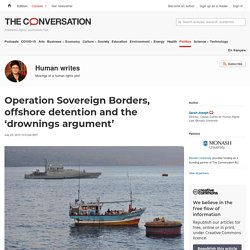
You can click through her presentation using Prezi below. On the day of the release of the Human Rights Commission’s report into children in detention, Prime Minister Tony Abbott said: Boat ‘turnbacks’ in Australia: a quick guide to the statistics since 2001. Updated 20 July 2018 PDF version [275KB] Harriet Spinks Social Policy Section This guide provides statistics on the number of boats that have been ‘turned back’ since the practice of removing unauthorised maritime arrivals in Suspected Illegal Entry Vessels (SIEVs) from Australian waters was introduced by the Howard Government (from 2001–2003) and reintroduced by the Abbott Government (in December 2013).
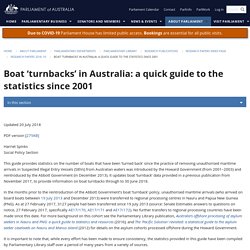
Stop the Boats - Refugee Council of Australia. Anti-Asian hate crime jumps 1,900 percent. In response to a major uptick in anti-Asian sentiment during the pandemic, the House of Representatives passed a resolution sponsored by Rep.
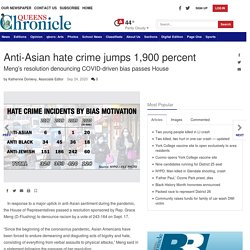
Grace Meng (D-Flushing) to denounce racism by a vote of 243-164 on Sept. 17. “Since the beginning of the coronavirus pandemic, Asian Americans have been forced to endure demeaning and disgusting acts of bigotry and hate, consisting of everything from verbal assaults to physical attacks,” Meng said in a statement following the passage of her resolution. Meng had introduced the measure in late March, just before first-quarter hate crime statistics revealed that the amount of reported anti-Asian hate crimes in the first three months of 2020 were nearly double the incidents of the last two years combined. According to NYPD data, hate crimes motivated by anti-Asian sentiment jumped by 1,900 percent in the last year — there was only one reported anti-Asian incident during all of 2019 compared to 20 in the first half of 2020. Protest against the Vietnam War outside Old Parliament House.
The Vietnamese refugees who changed white Australia. More than 80,000 Vietnamese people moved to Australia in the decade following the Vietnam War, many as refugees.
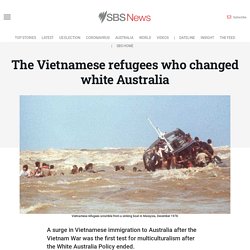
Thursday, April 30 marks 40 years since the North Vietnamese took the South’s capital of Saigon and renamed it Ho Chi Minh City after their former nationalist leader. Fewer than 700 Australians reported Vietnam was their birth place in the 1971 census but that number grew to more than 80,000 15 years later. At the most recent census in 2011 more than 180,000 Australians said Vietnam was their place of birth.
Australia Explained. History Although Australia had been fighting in many wars before it decided to send its military to Vietnam in 1962, this was the conflict that changed the country forever.
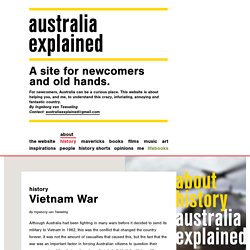
It was not the amount of casualties that caused this, but the fact that the war was an important factor in forcing Australian citizens to question their government and the choices it made on their behalf. Until the Vietnam War ended in 1975, Australian forces had been fighting somewhere in the world almost consistently since Federation in 1901, and without pause from 1939 onwards. The Australian Defence Force had sustained its biggest losses in WWI, leaving almost 60,000 (mostly) men behind, and WWII, when the country mourned 27,000 people. In comparison, the number of 521 men and women killed in Vietnam seemed almost negligible, especially if we also relate it to the estimated 2.5 million people who died in the conflict in total.
How Vietnam dramatically changed our views on honor and war. When Americans think of being at war, they might think of images of their fellow citizens suffering.
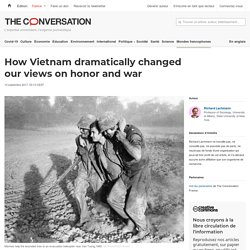
We count the dead and wounded. We follow veterans on their difficult journey of recovery from physical injuries and post-traumatic stress. We watch families grieve and mourn their dead. But it was not always this way. In fact, newspapers during Vietnam and earlier wars gave little space to portraying individual American service members. The real reasons the U.S. became less racist toward Asian Americans.
Chinese Australian Historical Society. 1960-1969: Students, citizenship & the end (nearly) of ‘White Australia’ With the exception of a small number of wartime arrivals from various regions of China, the sponsored arrivals, both official and unofficial, continued to be largely from the same small range of Cantonese speaking counties of southern China from where Chinese people had always come to Australia.
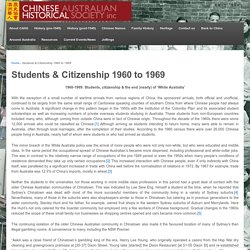
A significant change in this pattern began in the 1950s with the institution of the ‘Colombo Plan’ and its associated student scholarships as well as increasing numbers of private overseas students studying in Australia. Post War Migrants - bcpsyr62015. Migration due to War Throughout Australia’s History, many people have migrated and made Australia their home to find peace and protection from the violence, turmoil and wars of their homeland.
Brief history of Vietnam War: The Vietnam War / RSL NSW. 1968 began with a major offensive by the Viet Cong and North Vietnamese Army, launched during the Vietnamese lunar new year holiday period, known as “Tet”. Not only the timing but the scale of the offensive came as a complete surprise, taking in cities, towns, and military installations in South Vietnam. While the “Tet Offensive” ultimately ended in military defeat for the communists, it was propaganda victory. US military planners began to question if a decisive victory could ever be achieved and the offensive stimulated the US public opposition to the war. For Australian troops, the effects of the offensive were felt around their base at Nui Dat, where a Viet Cong attack on targets around Baria, the provincial capital, was repulsed with few casualties.
On This Day: Establishment of the “White Australia” Policy. Photo by author Over the last few years, the Law Library of Congress has published a number of reports related to the immigration and citizenship laws of various countries. For example, I’ve written reports about Australia’s points-based immigration system, guest worker programs, investor visas, and pathways to citizenship.
However, these projects did not involve delving into the early history of immigration law in Australia, which is actually very interesting. So, when I saw that December 23 is the anniversary of the promulgation of Australia’s first federal immigration law, the Immigration Restriction Act 1901, I thought that this would be a great opportunity to do some research, improve my knowledge, and share it with you all! Australia's Changing Attitudes To Immigration. The Scanlon Foundation surveys, for the first time in Australian research, provide an annual measure of attitudes to immigration, cultural diversity and social cohesion. The eighth national survey was conducted in 2015, with total respondents now numbering more than 25,000. The results provide a deep understanding of the constant and changing elements in national attitudes to cultural diversity and ethnicity. Asian Immigration. Current Issues Brief 16 1996-97 Adrienne Millbank Social Policy Group Contents.
IH10 SB CH10 Migration Experiences. The Vietnam War / RSL NSW. Election Speeches · Alfred Deakin, 1903 · Museum of Australian Democracy at Old Parliament House. The Immigration Restriction Act 1901. The ‘Workingman’s Paradise’, White Supremacy and Utopianism: The New Australia Movement and Working-Class Racism on JSTOR. Working Man's Paradise Finished. Australia - Australia since 1900. End of the White Australia policy. End of the White Australia policy. Islamophobia continues in Australia: 2019 report - CSU News. Repeort 1 islamophobia in australia updated 201920190318150537. The lead up to 1967. 1960s - At the heart of the protests - ANU Reporter. A look into Australia's own civil rights movement. Vietnam moratoriums. How Vietnam dramatically changed our views on honor and war. What was the White Australia Policy, and how does it still affect us now?
White Australia policy.